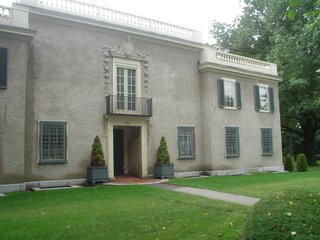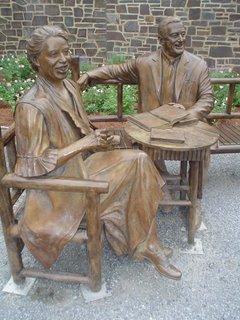August 20, 2006The Trouble When Jane Becomes JackBy PAUL VITELLOSAN FRANCISCO
IN the most recent season of the lesbian soap opera, “The L Word,” a new character named Moira announced to her friends that, through surgery and hormone therapy, she would soon be a new person named Max. Her news was not well received.
“It just saddens me to see so many of our strong butch women giving up their womanhood to be a man,” one friend said.
The sentiment was a tamer version of what many other women wrote on lesbian blogs and Web sites in the weeks after the episode was broadcast last spring. Many called for the Max character to be killed off next season. One suggested dispatching him “by testosterone overdose.”
The reaction to the fictional character captured the bitter tension that can exist over gender reassignment. Among lesbians — the group from which most transgendered men emerge — the increasing number of women who are choosing to pursue life as a man can provoke a deep resentment and almost existential anxiety, raising questions of gender loyalty and political identity, as well as debates about who is and who isn’t, and who never was, a real woman.
The conflict has raged at some women’s colleges and has been explored in academic articles, in magazines for lesbians and in alternative publications, with some — oversimplifying the issue for effect — headlined with the question, “Is Lesbianism Dead?”
It has been a subtext of gay politics in San Francisco, the only city in the country that covers employees’ sex-change medical expenses. And it bubbles to the surface every summer at the Michigan Womyn’s Music Festival, a lesbian gathering to which only “women born as women and living as women” are invited — a ban on transgendered people of either sex.
Barbara Price, a former festival producer, said the uneasiness has been “a big topic among lesbians for quite some time.”
“There are many people who look at what these young women are doing, and say to themselves, ‘Hey, by turning yourselves into men, don’t you realize you’re going over to the other side?’ ” she said. “We thought we were all supposed to be in this together.”
Beyond the political implications, the sense of loss is felt most keenly in personal relationships.
“I am a lesbian because I am attracted to women, and not to men," said a 33-year-old woman who broke up with her partner of seven years, Sharon Caya, when Sharon became Shane. The woman, who asked to be identified only as Natasha, to protect family members who are unaware of her lifestyle, said that she was ultimately faced with the reality of her sexual orientation and identity. “I decided I couldn’t be in a romantic relationship with a man.”
The transgender movement among men is at least as old as the pioneering surgery that turned George Jorgensen into Christine Jorgensen in 1952. Among women who wish to become men, though, the movement has gained momentum only in the last 10 years, in part because of increasingly sophisticated surgical options, the availability of the Internet’s instant support network, and the emotions raised by the 1999 movie “Boys Don’t Cry,” based on the true story of the murder of Brandon Teena, a young Nebraska woman who chose to live as a man.
The word for the process is “to transition,” a modest verb for what in women usually means, at the minimum, a double mastectomy and heavy doses of hormones that change the shape of the face, deepen the voice, broaden the upper body, spur the growth of facial hair, and in some cases, trigger the onset of male pattern baldness.
Politically and personally, the change has equally profound effects. Some lesbians view it as a kind of disloyalty bordering on gender treason.
The
Census Bureau does not try to count the number of transgendered people in the United States, and many who make the transition from one sex to another do not wish to be counted.
A European study conducted 10 years ago, and often cited by the
American Psychiatric Association, says full gender reassignment occurred in 1 in 11,000 men and 1 in 30,000 women, a ratio that would place the number of men who have become women nationally at only about 13,000 and women who have become men at about 5,000.
Transgender advocates, however, say those statistics fail to reflect an increasing number of people, especially young people, who call themselves transgendered but resist some or all of the surgeries available, including, for women becoming men, the creation of a penis. Some delay or avoid surgeries because of expense. For women especially, the genital surgery is still risky.
“There are tens of thousands of us, probably more than 100,000,” said Riki Wilchins, the executive director of GenderPAC, a lobbying group in Washington, citing the looser definition of being transgendered.
Dr. Michael Brownstein, a surgeon in San Francisco, said he had performed more than 1,000 female-to-male surgeries in the last several years, and transgender advocates say there are a dozen surgeons specializing in the work in the United States.
The numbers are slight, considering the estimated five million gay men and five million lesbian women in the United States. Still, coupled with a simultaneous trend among the young to reject sexual identity labels altogether, some lesbians fear that the ranks are growing of women who once called themselves lesbian but no longer do.
“It’s as if the category of lesbian is just emptying out,” said Judith Halberstam, a gender theorist and professor of literature at the
University of Southern California, San Diego, whose books include “Female Masculinity.”
Leaders of some lesbian organizations dismiss the idea of a schism or contend that it has been resolved in the interest of common human rights goals among lesbians, gays, bisexuals and transgendered people.
“The view in some lesbian corners that we are losing lesbians to transitioning is absurd,” said Kate Kendall, the executive director of the National Center for Lesbian Rights. “Given our history of oppression, all lesbians should encourage people to be themselves even if it means our lesbian sister is becoming our heterosexual-identified brother.”
But in private conversations and in public forums like women’s colleges, the questions about how to frame the relationship among lesbians, former lesbians and young women who call themselves “gender queer” rather than lesbian at all, seem largely unresolved.
“There is a general uneasiness about this whole thing, like ‘What are we losing here?’ ” said Diane Anderson-Minshall, the executive editor of Curve, a lesbian magazine. The issue stirs old insecurities about women being “not good enough,’’ she added.
Koen Baum, a family therapist in San Francisco who is a transgendered man, said the anxiety some lesbians feel has complicated roots. Some, he said, believe that women who “pass” as men are in some ways embracing male privileges.
Ben A. Barres, a professor of neurobiology at Stanford and a transgendered man, recently provided fodder for that view in an article in Nature and an interview with The New York Times. “It is very much harder for women to be successful, to get jobs, to get grants, especially big grants,” he told The Times.
The idea of male privilege was also part of “The L Word” plot: When Max learns he is to be offered a job that he was rejected for as Moira, he promises that he will refuse it and tell off the would-be boss, but he later decides to take the job and say nothing.
Mr. Baum said the anxiety also stems from fear over the loss of an ally in the struggle against sexism. “The question in the minds of many lesbian women is, ‘Is it still going to be you and me against sexism, you and me against the world?’ ” he said.
There are also practical questions: What place should a transgendered man have in women’s spaces such as bathhouses, charter cruises, music festivals and, more tricky still, at women’s colleges, where some “transmen” taking testosterone are reportedly playing on school sports teams?
Laura Cucullu, a freelance editor and recent graduate of Mills College in Oakland, Calif., phrased the question this way: “When do we kick you out? When you change your name to Bob? When you start taking hormones? When you grow a mustache? When you have a double mastectomy?”
The fact that there is no apparent parallel imbroglio in the gay community toward men who become women is a subject of some speculation.
“There is the sense that a transman is ‘betraying the team,’ joining the oppressor class and that sort of thing,” said Ken Zucker, a clinical psychologist and a specialist in gender research at the University of Toronto.
Despite the tangled set of issues involved, the survival rate of lesbian couples seems higher than among gay couples when one partner changes gender, advocates say.
After Susie Anderson-Minshall became Jacob several years ago, he and his partner of 15 years, Ms. Anderson-Minshall, the Curve editor, decided to marry. Their March 19 wedding was actually their second union. The first had been a partnership ceremony as lesbians; the second was as legally recognized husband and wife under the laws of the state of California, where they live.
Other couples, like the former Sharon Caya and Natasha, found the transition much rougher. Sharon’s decision to become Shane coincided with Natasha becoming pregnant, having conceived with donor sperm. “When the baby came along, I wanted to become myself,” Mr. Caya said. “I wanted the baby to know me as I truly am.”
She began taking testosterone about three years ago, then had “top surgery” — a double mastectomy — and is now a muscular 42-year-old of medium height with long sideburns and a goatee.
For financial and practical reasons, Mr. Caya, the legal director of the Transgender Law Center in San Francisco, decided to forgo “bottom surgery,” which could cost as much as $100,000 and would involve two or three operations to graft on an ersatz penis.
According to the standards of the European study, Shane Caya would not be counted as a transgendered person.
Natasha, a financial manager in San Francisco, still cries when describing Sharon’s decision to become male.
“You’re in love with a person, but there is something about gender that is so central to identity it can be overwhelming if the person changes,” she said.
“When she told me what she wanted to do, I was completely blown away at first,” Natasha said. Then, “I thought to myself, ‘All right, we’re good lesbians. We should be able to figure this out.’ ”
But after a month of struggling with the idea, Natasha said she could not make the adjustment. The breakup occurred when the child was 5 months old. The couple remain on friendly terms and share custody.
And when Mr. Caya attended a lesbian organization’s lunch recently, he recalled, he was welcomed by a woman who said she was “pleased to see a man supporting us lesbians.” His reply, he said, was quick and to the point:
“Of course I support lesbians,” he said. “I used to be one.”





